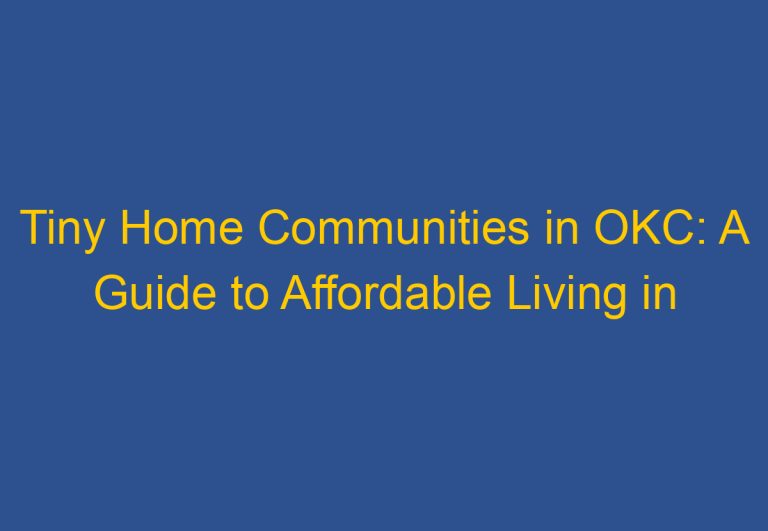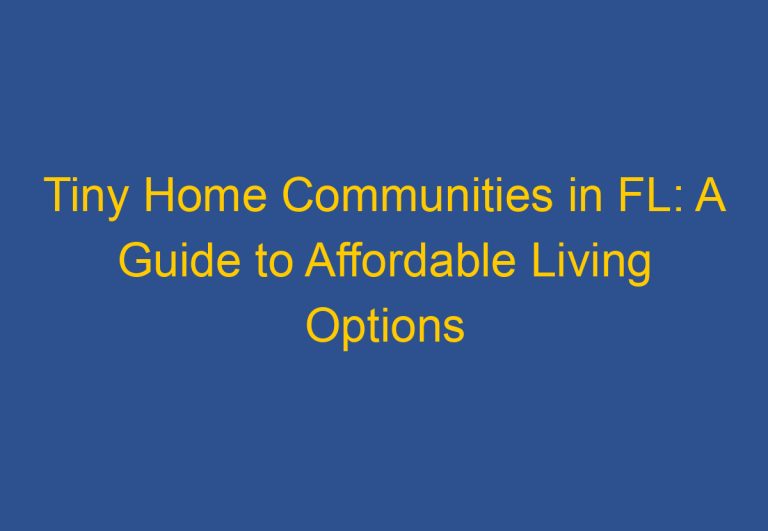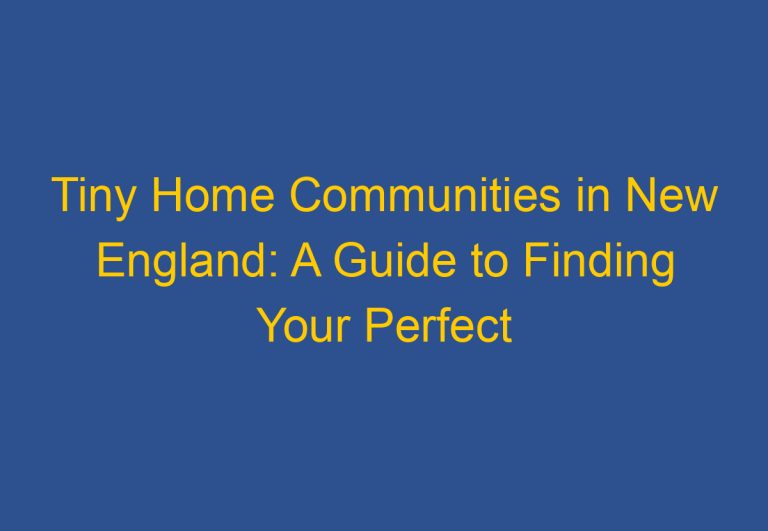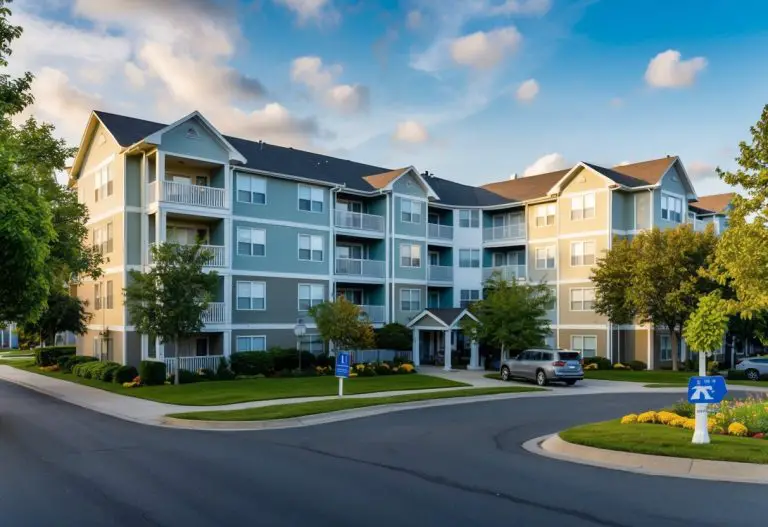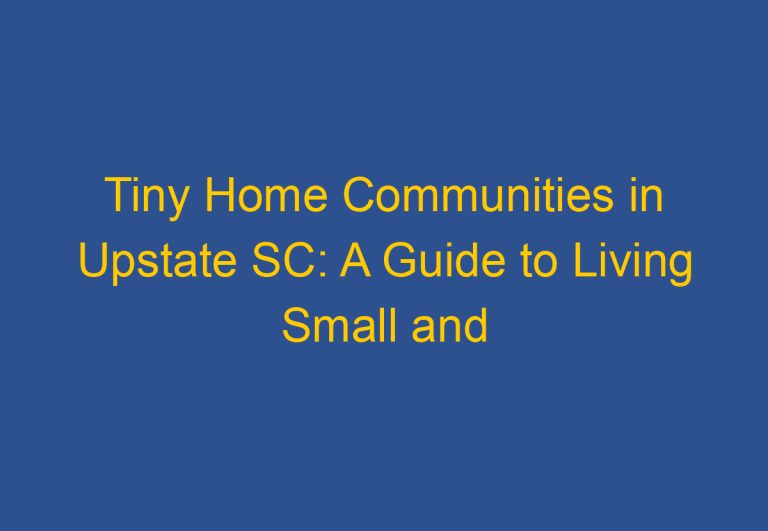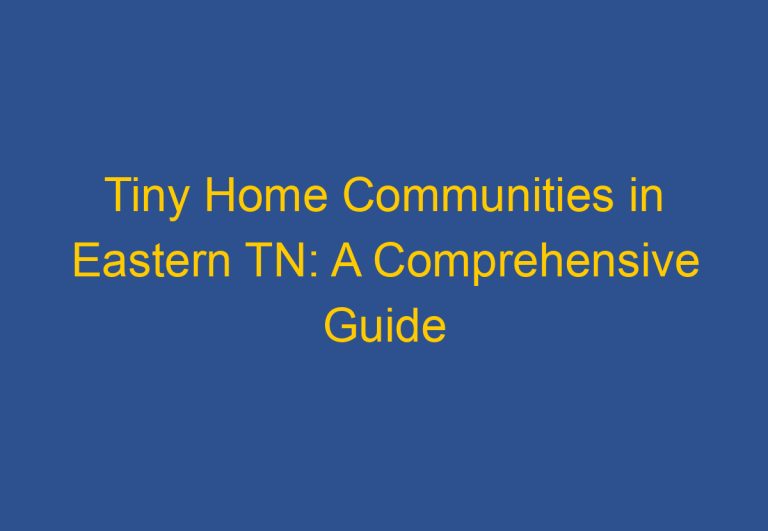Tiny Home Communities in Colorado: Where to Find Them and What to Expect
Tiny home communities are becoming increasingly popular in Colorado, offering a unique opportunity for individuals to live small and enjoy the breathtaking beauty of the Rocky Mountains. These communities are often designed to be sustainable and eco-friendly, with a focus on minimizing waste and reducing one’s carbon footprint.
There are several tiny home communities in Colorado, each with its own set of benefits, types, and requirements. Some communities offer full-time living, while others are designed for vacationing or building one’s own tiny home. The legal acceptance and zoning of tiny homes in Colorado has also been growing, with the first legal community in El Paso County and the newest in Leadville.
For those interested in tiny home living, Colorado provides a diverse landscape ranging from rugged mountains to serene plains, making it an ideal backdrop for tiny home communities. With the increasing popularity and acceptance of tiny homes in Colorado, it is an exciting time for those looking to downsize and live a more sustainable lifestyle.
Exploring Tiny Home Communities in Colorado
Benefits of Tiny Home Living
Tiny home living has become increasingly popular in recent years, and for good reason. Those who choose to live in tiny homes often do so to embrace a minimalist lifestyle, reduce their environmental impact, and save money on housing costs. Many tiny home communities in Colorado offer a variety of amenities and activities for residents to enjoy, such as community gardens, dog parks, and scenic mountain views.
Popular Locations for Tiny Homes in Colorado
Colorado is home to many tiny home communities, each with its own unique charm and appeal. Some popular locations for tiny homes in Colorado include:
- Lyons: WeeCasa is a tiny house hotel and community located in Lyons, offering guests the opportunity to experience tiny living firsthand.
- Crested Butte: The Villages at Crested Butte is a vibrant tiny home community offering a variety of amenities and activities, including a community garden and dog park.
- Boulder: Mountain View Village is located in the scenic city of Boulder, nestled amidst the breathtaking Rocky Mountains. This community provides a peaceful retreat for tiny house enthusiasts.
- Woodland Park: Peak View Park is a park model and tiny house on wheels community for full-time living, located just 25 minutes northwest of Colorado Springs.
No matter where you decide to settle down, living in a tiny home community in Colorado offers a unique opportunity to embrace a minimalist lifestyle while enjoying all that the beautiful state has to offer.
Regulations and Zoning for Tiny Homes
Building Codes and Standards
Colorado defines tiny homes based on their standard square footage: 100 to 400 square feet. While most other states comply with minimum square footage for tiny homes, Colorado follows their basic definition. According to the rules of Colorado, a tiny home can have somewhere between 100 to 400 square feet. However, any house smaller than 1,000 square feet must comply with the state’s building codes and standards.
Building codes and standards cover a wide range of safety and health issues, such as electrical wiring, plumbing, and fire safety. It is essential to ensure that your tiny home meets all the necessary building codes and standards to avoid any legal issues.
Zoning Regulations in Key Areas
Zoning regulations for tiny homes vary by city and county in Colorado. Some areas have specific requirements for the size of the home, the foundation type, and the minimum square footage. It’s important to check with your local government and building codes department to ensure that your tiny home meets all the zoning regulations in your area.
For example, La Plata County has specific zoning regulations for tiny homes. According to the regulations, tiny homes must be on a permanent foundation and have a minimum square footage of 500 square feet. The county also has specific landscaping and lot rent requirements for tiny homes.
RV parks are a popular option for tiny home communities in Colorado. However, it’s essential to ensure that the RV park allows tiny homes and has the necessary facilities, such as THOW parking and hookups.
In summary, it’s crucial to research and comply with the specific regulations and zoning requirements of the area where you plan to establish or join a tiny home community. By doing so, you can avoid any legal issues and find solace in the close-knit community of like-minded individuals.
Amenities and Services in Tiny Home Communities
Community Features and Services
When it comes to tiny home communities in Colorado, residents can enjoy a variety of amenities and services that enhance their living experience. Many communities offer a community garden where residents can grow their own produce and enjoy the outdoors. Additionally, some communities have a fire pit where residents can gather and socialize. Landscapes are also an important feature of many tiny home communities, with well-maintained gardens and green spaces providing a peaceful and relaxing atmosphere.
Water and sewer services are typically included in the monthly lot rent, as well as cable TV and high-speed internet. Laundry facilities are also available in most communities, making it easy for residents to take care of their laundry without leaving the community.
Utility and Maintenance Considerations
One of the benefits of living in a tiny home community is that many of the maintenance and utility concerns are taken care of by the community management. For example, landscaping and snow removal are typically handled by the community, freeing up residents to enjoy their homes and surroundings.
Some communities also offer gardening services, where residents can have their own garden plot and receive assistance with planting and maintaining their garden. This is a great option for those who want to grow their own produce but don’t have the time or experience to do so.
Overall, tiny home communities in Colorado offer a range of amenities and services that make them a great choice for those seeking a simpler, more sustainable lifestyle. With well-maintained landscapes, water and sewer services, and a variety of community features, residents can enjoy all the benefits of tiny home living without sacrificing convenience or comfort.
Lifestyle and Recreation Opportunities
Outdoor Activities and Attractions
Colorado is known for its stunning scenery and outdoor adventures. The state offers a plethora of opportunities for outdoor enthusiasts, including hiking, skiing, fishing, and mountain biking. With its mountainous terrain and hiking trails, Colorado is a perfect destination for those who enjoy outdoor recreation.
Tiny home communities in Colorado, such as High Country Haven in Breckenridge, offer residents the opportunity to enjoy year-round outdoor activities. Located in the heart of the mountains, High Country Haven is a mountain retreat that provides easy access to skiing, hiking, and mountain biking.
Community Events and Socializing
In addition to outdoor activities, tiny home communities in Colorado provide residents with opportunities for socializing and community events. These communities offer a sustainable lifestyle that promotes social interaction and community involvement.
For instance, the Tiny House Expedition, a new tiny home community in Colorado, features eleven 36-foot wide spaces and eleven 50-foot wide spaces with room for yards, landscaping, gardening, picnic tables, and a shed or small studio space. The community also hosts events and activities, such as potlucks and game nights, which provide residents with opportunities to socialize and connect with their neighbors.
Overall, tiny home communities in Colorado offer a unique lifestyle that combines outdoor recreation and community involvement. Whether you are looking for a vacation rental or a permanent residence, Colorado’s tiny home communities offer a sustainable and affordable option for those seeking a simpler way of life.
Frequently Asked Questions
What are the top-rated tiny home communities in Colorado?
Colorado has a growing number of tiny home communities, each with its own unique charm and features. Some of the top-rated tiny home communities in Colorado include Tiny Town Estates in Larkspur, WeeCasa in Lyons, and Sprout Tiny Homes in La Junta.
Where can I find luxury tiny home communities in the state of Colorado?
For those seeking a more luxurious tiny home community experience, Colorado has several options available. The River Run Resort in Granby offers high-end amenities such as a spa, hot tubs, and a fitness center. The Escalante Village in Durango provides residents with access to a communal garden, a clubhouse, and a pool.
Are there any affordable tiny home communities in Colorado?
Yes, there are affordable tiny home communities in Colorado. For example, the Peak View Park in Woodland Park offers tiny home lots starting at just $350 per month. Other affordable options include the Salida River Front Park and the Village at Flat Rock in Fort Collins.
Can you purchase tiny homes within communities in Colorado?
Yes, many tiny home communities in Colorado offer tiny homes for purchase. WeeCasa in Lyons, for example, has a variety of tiny homes available for purchase. Other communities, such as Sprout Tiny Homes in La Junta, offer custom-built tiny homes for purchase.
What counties in Colorado are known for being tiny house friendly?
Several counties in Colorado are known for being tiny house friendly, including El Paso County, Summit County, and San Juan County. These counties have zoning regulations that allow for tiny homes and tiny home communities.
How much is the average cost to build a tiny house in Colorado?
The cost to build a tiny house in Colorado can vary widely depending on the size, features, and materials used. However, on average, it can cost between $30,000 and $60,000 to build a tiny house in Colorado. Factors such as labor costs, permits, and land also contribute to the overall cost.







